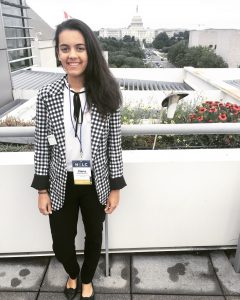Fourth Annual Model United Nations at UNG
Global Epidemics and the Right to Information
March 9, 2020 by Maria Julia Müller Bortolucci
DAHLONEGA – On February 28th, 2020, the UNG Model United Nations student organization hosted the Fourth Annual Model United Nations at UNG on the topic of Global Epidemics and the Right to Information. The event was a simulation of a General Assembly Plenary session of the United Nations. It took place from 8:30 a.m. to 4:30 p.m. with 18 delegations represented countries in Asia, North and Latin America, Europe, and Africa. Many participating students were Political Science, International Affairs and Strategic and Security Studies majors, and there were students from many other majors across UNG. Many delegation leaders are currently completing their International Affairs Capstone Seminar and the Model United Nations Club at UNG. At the dais table, Jenna Patterson and Anna Caitlyn Anderson led the conference.
Moreover, many faculty members were essential players in the organization of the conference. It is worth highlighting the essential role of Dr. Jonathan Miner and Dr. Bibek Chand in planning the conference; these professors are the current advisors of the Model United Nations Club (or Model UN Club as it will be called henceforth) on the UNG Dahlonega and Gainesville campuses, respectively. Also worth mentioning are the great contribution of Dr. Craig Greathouse, Dr. Hamid Serri, Dr. Raluca Viman-Miller, and Dr. Nathan Price. These faculty members were of great contribution to the conference’s crisis topics and delegate recruitment.
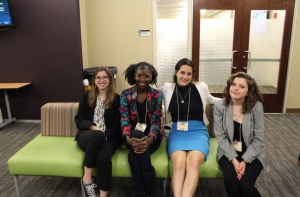
Students from different UNG campuses have the chance to be part of the on-campus Model UN. The picture shows students from both the Gainesville and the Dahlonega campuses. The Model UN Club at the UNG Gainesville campus is in the process of being formally institutionalized, but its meetings already count with approximately ten participants. Dr. Bibek Chand advises the Gainesville Model UN Club; this club partners with and learns from the Dahlonega club, according to Dr. Chand.
Different Challenges
In their interviews, delegates shared their perspectives about the event held on the Dahlonega campus. While most of them explicitly stated that the event was fun, they recognize some of the challenges of participating in this type of event. Jacob Drobney, an International Affairs major from Kennesaw, Georgia, expressed that the main challenge of the event is on translating ideas into written words that may or may not please other delegates. Regarding this challenge, Jacob claims that “it is one thing to talk about what you would like to see; it is another thing to sit down and actually write things out and get people to get on board with the way you are wording things.”
While Jacob focuses on the challenges of written communication, JEB Edmondson, a Political Science major from Roswell, Georgia, touches on the challenges of oral communication. In the context of a formal diplomatic conference, there are both formal and informal difficulties in reaching consensus among the 18 delegations. “You can’t really talk [with your delegation] during the speaker’s list, and you can’t really talk during the moderated caucus. You can’t really talk during [the] unmoderated [caucus], you are too busy [talking to other delegations],” as argued by JEB. To clarify, the speaker’s list refers to a formal debate in which the broad issue of the session is approached by the different countries. A moderated caucus refers to a formal debate about a subtopic of the overall topic of the session; an unmoderated caucus is defined similarly to the latter, except that it is informal, which means that delegates can walk around and talk to other delegations.
Other challenges appear when looking at the organizational side of the conference. Anna Caitlyn Anderson (AC), a Political Science major with concentration in Pre-Law from Gainesville, GA, talks about the logistical challenges of planning this event. AC claims that different pieces of the conference come from different agents, so “making sure that everything flows smoothly to the actual day of the on-campus conference is the hardest part.” Despite of or even because of some of these challenges, students find the Model UN conference quite rewarding.
Going Beyond Textbooks!
Dr. Bibek Chand, Assistant Professor of Political Science, discusses some of the aspects that make the Model UN conference so rewarding. The current advisor of the UNG Gainesville Model UN Club, Dr. Chand argues that UNG’s Model UN is a great opportunity for students to practice for bigger conferences, such as the Southern Regional Model United Nations (SRMUN). According to Dr. Chand, “no matter how much you read, you will never understand it [the workings of the Model UN or the United Nations itself] until you actually get a feel about how engaging it is.”
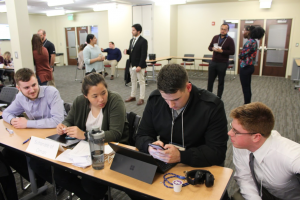
Delegates discuss ideas during an unmoderated caucus. A final unmoderated caucus of forty five minutes is provided for countries to write their resolutions.
AC, who participated in last year’s SRMUN conference in Atlanta and will represent Sri Lanka in this year’s SRMUN conference in Charlotte, NC, agrees. She explains that her experience as a dais of the UNG Model UN conference this year helps her to better understand the details of how a Model UN conference works. Dr. Chand explains that with UNG’s Model UN conference, students have “more room to make errors.”
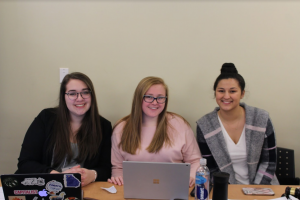
The dais (left to right: Jenna Patterson, Anna Caitlyn Anderson, and Brianna Clay: students with experience in regional Model UN conferences have the chance to organize the conference and run the sessions in the position of dais.)
The Crisis
One example of how the Model UN on campus is helpful to develop students’ skills is the crisis simulation presented during the conference. Every Model UN conference has crisis topics, which are basically new pieces of information introduced at any point during the sessions regarding the current state of the world. This mix of true and invented pieces of information is designed to influence the issue in discussion and are presented as a news headlines. Dr. Chand argues that this leads countries to adopt new responses and perhaps new positions regarding the issue. He also argues that they are extremely beneficial for students to understand how dynamic the international system is. Some examples of the information disclosed during this crisis:
- The reporting of cases of Coronavirus in Iran, which led to deaths and infections of government officials (true);
- The reporting of the first cases of Coronavirus in Brazil and the United States (true);
- A spread of cases of Coronavirus from Iran to Saudi Arabia and Bahrain (true), causing a 50 percent drop in oil production (untrue) as well as the halting of the traditional Saudi Arabian pilgrimage to Mecca (true);
- A 2,000-point drop in stock markets in the United States (true);
- The closing of Japanese schools due to the Coronavirus (true);
- The development of mutant strains of the Coronavirus in Dallas, Texas (USA) and Wuhan (China). The mutation of the virus in the former country does not present a clear way of transmission; as for the latter, the mutated strain is considerably more infectious (untrue).
- Chechen terrorist groups use nuclear weapons, acquired through North Korea, and threatened against Russian cities (untrue).
Helping Students on Their Short and Long-Term Goals
Public Speaking
Besides the stated benefits provided to those involved in regional Model UN conference, the UNG Model UN event also provides alternative benefits to different students. Jacob, who is commissioning into the Army, argues that this is experience has helped him apply his public speaking and team-work skills. This will help him with his career in the military as well as his long-term goals of working in the public and private sectors.
Putting On Someone Else’s Hat
Jacob, who represented India at this conference, also discusses how different it is to convey and defend an opinion that is significantly different from his own. He argues he is not “naturally accustomed” to the religious values that are embedded into political decisions in India. This is a reality for most students who have been delegates at a Model UN conference. As AC argues, you have to put on “a cap of another person from another country.” She argues that, even as a dais, you still have to maintain a neutral position that does not necessarily reflect who you are. This is presented as a challenge but also as a positive outcome of this type of conference. Arianne Melessse, a Biology major who was representing Brazil at the conference, also recognizes the importance of incorporating “a different mindset than that of my country.”
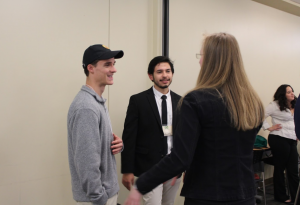
The UNG Model UN conference provides not only the opportunity to learn and develop unique skills, but it also allows students to make friends and important connections on campus.
Epidemics and the Right to Information
This year’s conference focused on an extremely pressing theme in the current global scenario. The Coronavirus, as expected, was the main focus of the Model UN conference and some attacks were directed towards China regarding its lack of transparency regarding the number of cases in the country. In order to better understand the countries’ position, I interviewed two major players of this situation: the United States and China.
James Cameron Heriot, an International Affairs major with concentration in Asia, was representing China. As the delegation of China, he argues that the country has worked within its region — mainly with South Korea — to provide cooperation on “spreading of information, providing health care, [and] think tanks” to contain epidemic diseases which includes the Coronavirus. The Shanghai Cooperation Organization and Asia-Pacific Economic Cooperation are examples of tools he proses to utilize against the threat of endemic diseases. The delegate does highlight the importance of sovereignty to China, but the delegation deems cooperation necessary in some issues. Very little is mentioned regarding freedom of information.
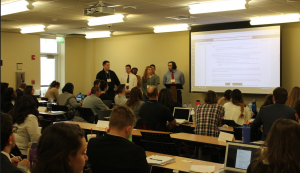
Coalition of countries presents the second resolution. A total of three resolutions were presented at the General Assembly Plenary session of that Friday, February 28th, 2020. After presented, sponsors of the resolution answer questions from other delegations. Voting procedures take place after the presentation of all resolutions.
As for the United States, JEB Edmondson, who was one of the delegates representing the country, argues that “money needs to be committed to fight, contain, and — at least with the current administration — help secure borders so the disease does not get in so easily.” He expresses discontent regarding China’s attitude of being “less than forthcoming to say the least,” and says that the U.S. would seek to pressure China to “be more open.” While China argued that it would seek to cooperate with Asian countries, the United States said that it was willing to gain support during the unmoderated caucus. JEB says that “even if they might not like us during the moderated [caucus], we know we kind of have them on our back pocket during the unmoderated caucus.”
At the end of this Model UN General Assembly Plenary session, delegations presented three resolutions. The first resolution – sponsored by Nigeria, Oman, and Russia – aimed at dealing with the last crisis situation presented (i.e., the Chechen nuclear terrorist attack). Countries proposed actions through the UN Security Council as well as other international actors to deal with the issue. In the second resolution – sponsored by China, Korea, Oman, Nigeria, Russia, Saudi Arabia, Tanzania, and Venezuela –, countries proposed actions to contain the mutant strains of the Coronavirus. They also included actions of control of border and other techniques to contain the spread of endemic diseases. The resolution also encouraged bilateral and multilateral cooperation. Finally, the third and last resolution presented at Friday’s General Assembly Plenary session focused on three areas: 1) promotion of transparency of information; 2) cooperation of countries through an international committee; and 3) the sharing of information to contain and prevent endemic diseases and their spread. The resolution was sponsored by Brazil, Chile, India, Ireland, United Kingdom, and the United States.

Coalition of countries presents the first resolution. A total of three resolutions were presented at the General Assembly Plenary session of that Friday, February 28th, 2020. After presented, sponsors of the resolution answer questions from other delegations. Voting procedures take place after the presentation of all resolutions.
Interdisciplinary Nature of the Model UN
Although most participants of this year’s Model UN at UNG were Political Science, International Affairs, and Strategic and Security Studies majors, the event embraces and encourages a wide array of fields. Arianne argues that, as a Biology major, she presents a unique perspective into the issue of Global Epidemics and the Right to Information. While most delegates focus on the political negotiations and socio-economic solutions, Arianne can provide a more technical perspective on endemic diseases such as the Coronavirus. As argued by her, she has a greater “focus on vaccinations and containment” as well as “technical and factual things that we need to do.”
According to the Center for Disease Control and Prevention (2020), the Coronavirus easily spreads from person to person or through contact with contaminated surfaces. The symptoms include coughing, fever, and respiratory difficulties. Because there is no vaccination to this disease yet, it is recommended that those who present the symptoms isolate themselves and maintain them and their environment as clean as possible. Natural scientists such as Arianne are therefore essential delegates for global decision-making regarding investment in scientific research. Arianne served as a liaison between politicians and the voice of the scientific community, providing unique experience for her as she gains different political perspectives from around the world.
Therefore, the Fourth Annual Model UN Conference at UNG helped students learn, have fun, and create empathetic feelings towards different perspectives — of other nations or fields of study. If you interested and willing to take advantage of all of these benefits, please join the Model UN club and/or make sure to be part of the Fifth Annual Model UN Conference in 2021.
References:
Coronavirus Disease 2019. (2020). Retrieved from https://www.cdc.gov/coronavirus/2019-ncov/index.html
